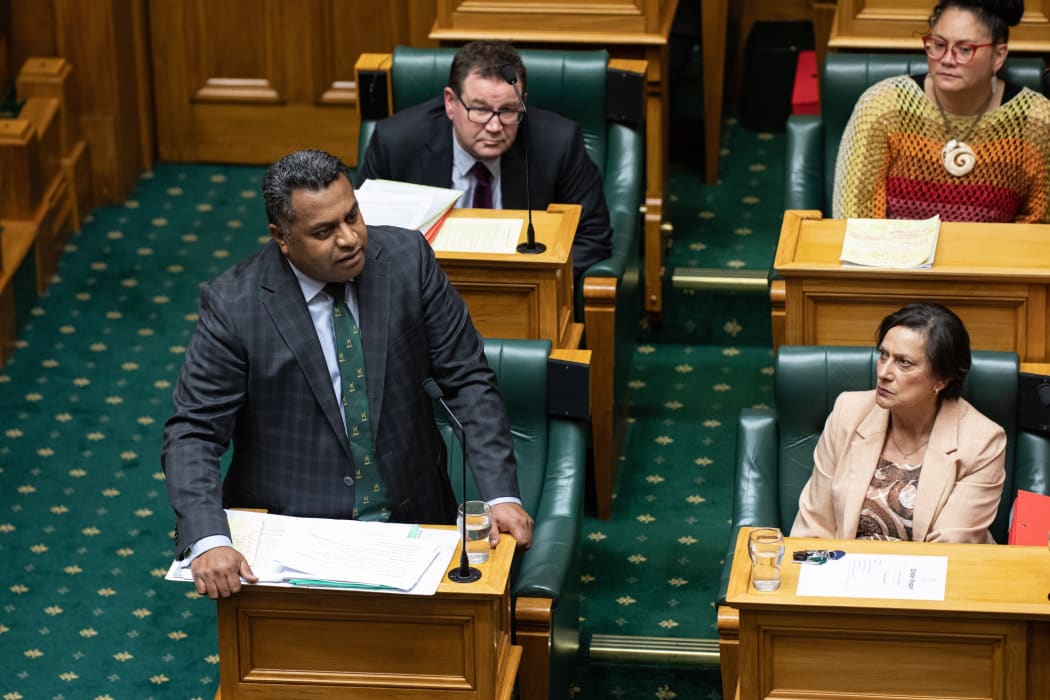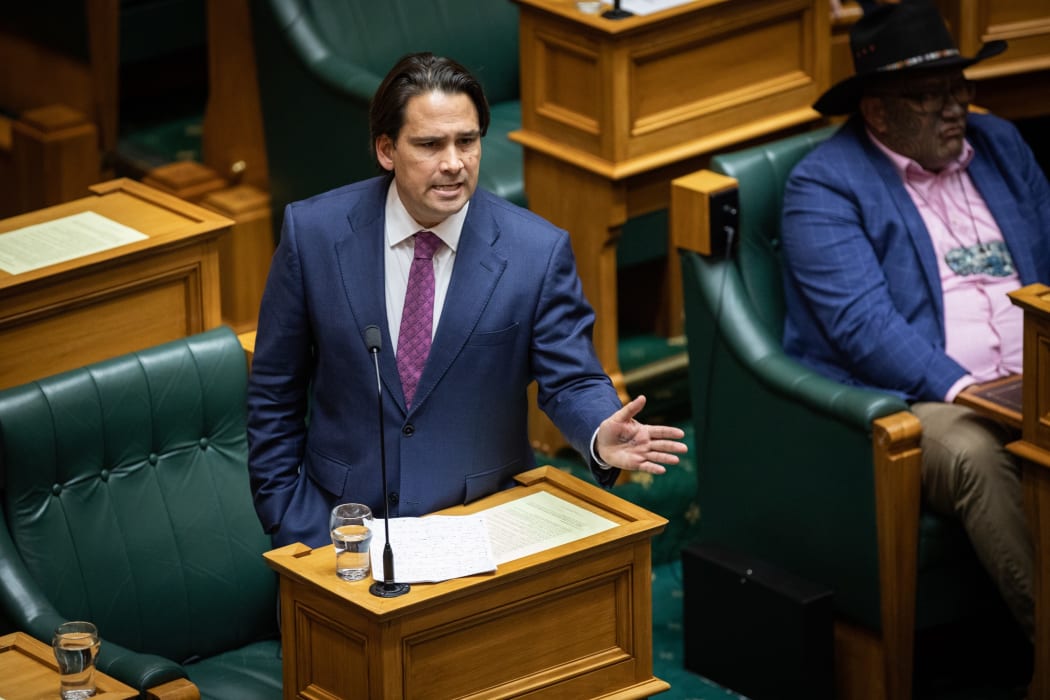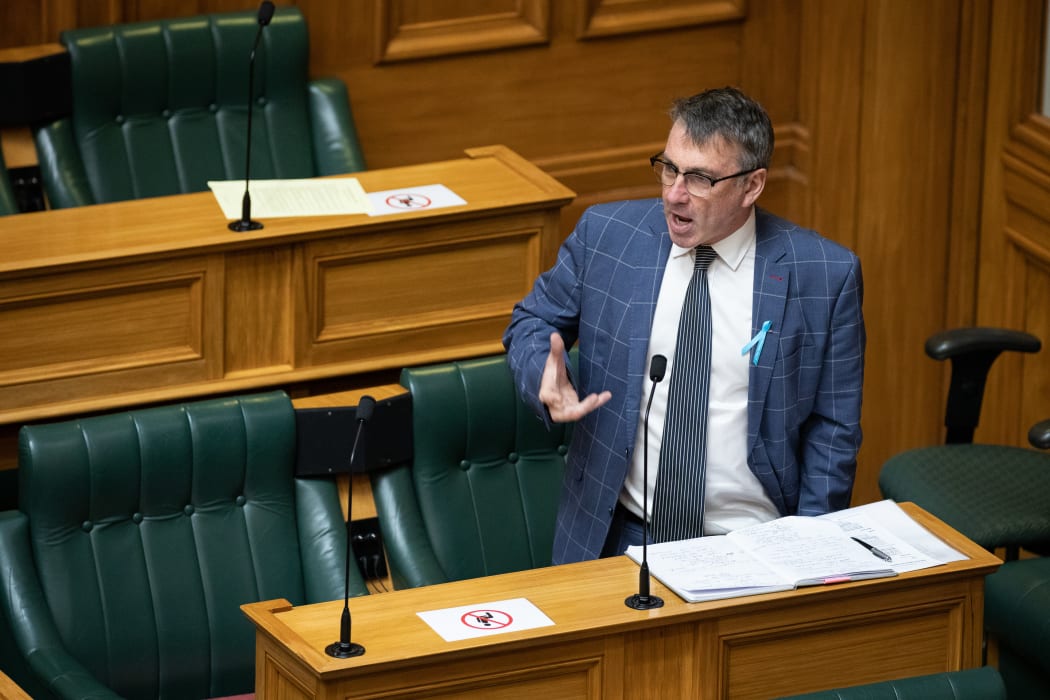It would be easy to think, from the news, that the only thing politicians are working on at the moment is Covid-19 - but that would be wrong.
It is true that Covid-19 comes up often but it’s one of many things. There is still a country to run after-all.
For example, this week Parliament is likely debating eight or nine different proposed laws (bills), depending on their speed. Just one of them is on Covid-19.

Kris Faafoi, as Minister of Justice is in charge of this bill. (file photo) Photo: VNP / Phil Smith
The other bills range widely and have included rules for: the decommissioning and clean-up of oil rigs and the like, the testing of illegal drugs, Teaching Council fees and levies (that one is now agreed), monitoring and complaints oversight for Oranga Tamariki (and at the same time a new independent Children and Young People’s Commissioner to advocate on their behalf).
And a repeal of the three-strikes sentencing regime that was introduced in 2010 by the then National/ACT coalition. That's the bill we are focusing on here. It was a first reading so there will be a call for public submissions on it. Break out the pencil case.
To help your thinking, here is some background to the Three Strikes Repeal Legislation Bill.
Firstly, the parties are split broadly left/right on the bill. Labour, Green and Te Pāti Māori are in favour of repeal. National and ACT are opposed. It was originally an ACT party policy.
What is three strikes?
The three strikes system creates a mandatory sentencing regime for a range of offences, but 90% of first strikes and 95% of second strikes are for robbery, assault or sexual assault.
The Ministry of Justice describes it like this:
“If an offender is convicted for one of the 40 qualifying offences for the first time (with no previous strike warnings), they receive an official first ‘strike’ warning. If they are convicted of a second qualifying offence they are given a final warning (second strike), and if they are sentenced to imprisonment they may serve the full sentence without parole.” On a third strike the longest possible prison term without parole is mandatory.
The repeal bill’s explanatory note says:
“The three strikes law was intended to deter those who commit specified offences with the threat of progressively longer mandatory prison terms, and to incapacitate those who continue to re-offend despite the additional penalties.”
In 2017 the Ministry of Justice compiled a fascinating evidence brief on the policy which is worth a read.
What would replace three strikes?
The new bill repeals the three strikes system.
Judges would return to having a wider power of discretion for those 40 offences (as they still do for other offences). They would determine a sentence within a mandated range for each offence according to the guidelines laid out in the Sentencing Act 2002, interpreted according to the case in front of them.
The Sentencing Act lays out a wide array of considerations and mitigating and aggravating factors that judges should take into account - things like an offenders’ age, or mental capacity, the impact on the victim, and whether there had been a guilty plea.
The Sentencing Act is a chunky (242 page) piece of legislation that provides a small insight into the vast complexities that can be involved in sentencing.
The party arguments
Both sides of the House argued that evidence supports their case. Neither had a lot of evidence to point to.
In fact the Justice Department noted in that 2017 report that there hasn’t been much research internationally on the impact of Three Strikes style systems and what there has been “appears to be prone to political bias”.
One difficulty is that without real research most evidential postures on the Bill could be used as evidence either way. For example Simon Bridges began the opposition response to the Bill with a ‘tough on crime’ stance:
“At a time of record violence, at a time of record gun crime under the Labour Party, at a time when gangs are creating record havoc and misery around this country—more victimisation than we've ever seen in this country—is it really the time to go soft on crime?”
But while that argument would likely find agreement with those in favour of Three Strikes it also happens to have been part of the Government’s evidence against it, for example in Kris Faafoi’s speech to introduce the Bill:
“[Former ACT MP David] Garrett said that by passing this [Three Strikes] legislation, we would make our communities safer and we would see the numbers of these serious offences drop. Well, that is not the case. It is not borne out in the evidence in the 10 years since this piece of legislation passed.”

National MP Simon Bridges speaks in the debate on Conversion Practices Photo: VNP / Phil Smith
Victims and offenders
Both sides of the debate spent a fair bit of time talking about the victims of crime.
“This Government is not putting the victims at the centre of the justice system, and that's very much what ACT intended to do when we put this bill through and it became an Act of law. And what we intend to carry on doing is making sure the victims, not the criminals, take centre stage within our justice system.” - Nicole McKee (ACT)
“Shall we take the age of the offender into account? No? Shall we take, perhaps, whether or not the offender pleaded guilty? That's an important one, because we know that serious offenders who plead guilty have that taken into account largely because it's a much better outcome for victims. Victims are not put through the trauma of a trial, and we need to be able to encourage that, not to tell a third-strike offender, "Don't worry. Go through a full trial, put your victim through another trauma, because you get no discount for it." - Duncan Webb (Labour)
Those in favour of the repeal also noted that Three Strikes has disproportionately affected Maori and Pasifika. The Ministry of Justice research noted that “like the New Zealand prison population, Māori and Pasifika were over-represented in the proportion of strikes received (Māori = 48%, Pasifika = 15%, European = 33%) when compared to the general population.”
A Judicial Perspective
Something else that came up a lot during the debate was the judicial perspective.
Particularly relating to a recent case where the Supreme Court ordered the re-sentencing of an offender reportedly with serious mental ill health who had attempted to kiss a woman in the street and was given a mandatory seven year sentence for the indecent assault.
Simon Bridges referring to that :
“...there is a growing trend from our judiciary in New Zealand seeking to push back against Parliament and assert interpretations that aren't conventional on parliamentary statutes and powers for themselves that they have never had. In relation to sentencing of criminal justice, courts increasingly want to assert that a complete judicial discretion belongs and exists for them. Well, they are wrong. There is no such principle. Parliament and its sovereignty determines sentencing policy, as well as a raft of other things, not the judiciary.”
And on the same decision Labour’s Duncan Webb:
“The Court of Appeal, when it looked it, said this: ‘Mr Fitzgerald should be receiving care and support in an appropriate facility, not serving a lengthy term of imprisonment. He has ended up in prison for a very long term, in circumstances where he should not be there at all.’ That's what the National Party would have us stick with. In that case, the Supreme Court has had to do linguistic somersaults to find a way for this mentally disabled person to avoid it.”
It’s interesting to note that there were both lawyers and former prosecutors on both sides of the debate.

Duncan Webb debates in the House Photo: VNP / Phil Smith
The Bill of Rights
Related to the judicial finding, a couple of quotes from the debate in relation to the Bill of Rights.
First, again, Simon Bridges.
“The final thing they say is, ‘Well, this bill, it offends against the New Zealand Bill of Rights Act.’ As if the New Zealand Bill of Rights Act is some sort of religion we have to follow with the Pope being ‘Saint Geoffrey Palmer II’. ‘It's a religion. We have to follow it. We just can't ever do anything. Parliament can never pass a law if there's a New Zealand Bill of Rights Act issue in it.’ Here's the problem with that: the Labour Party is exceptionally venal and acts exceptionally conveniently when it comes to that argument, because right now at the Justice Committee we've got a hate speech law, we've got a conversion practices law, we've got several other laws that Kris Faafoi's come to this House on and spoken on that grossly offend the New Zealand Bill of Rights Act. It's all too convenient to come down here and give us that sort of conversation.” - Simon Bridges
And from Labour, Duncan Webb again.
“On this side of the House, we believe in human rights, and section 9 says that ‘Everyone has the right not to be subjected to torture … cruel, degrading, or disproportionately severe treatment’. And you know what? Here's a few words you might find familiar: that the three-strikes legislation will result in ‘disparities between offenders that are not rationally based’ and it will result in ‘gross disproportionality in sentencing’, and ‘I consider it to be in contravention of the Bill of Rights Act.’ —[those were the former National Party MP and] great Attorney-General Chris Finlayson's words on this Act when it passed the House.”


